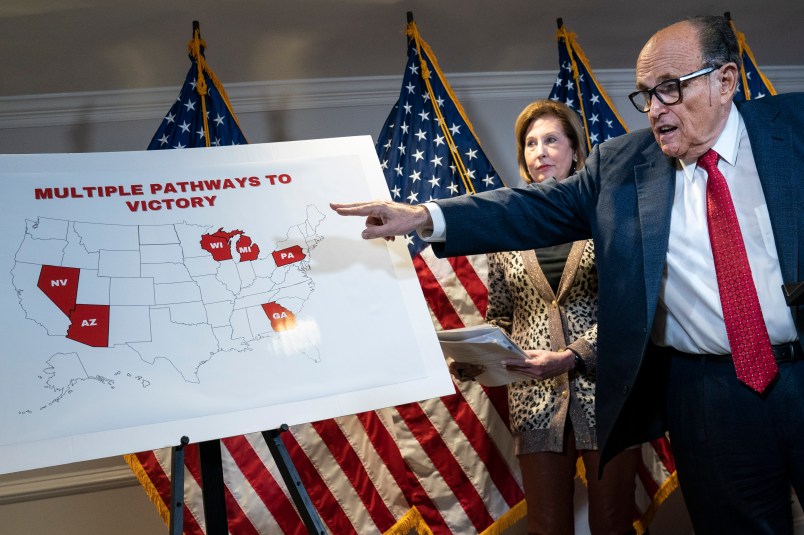The city of Detroit told the federal judge on Tuesday that sanctions are warranted in a case seeking to disturb Michigan’s election results.
The case was brought by allies of President Trump. Detroit wants the challengers – three local GOP officials and three Trump electors — to pay back to the defendants the costs and fees incurred in the litigation.
Detroit said on Tuesday that, in a coming filing, the city will lay “out many of the intentional misrepresentations made by Plaintiffs in their filings in this case.”
“Plaintiffs are trying to send the message that our democracy cannot be trusted,” the filing later said. “It is time for this Court to send a message back: lies and frivolous claims will not be tolerated. This abuse of our legal system deserves the strongest possible sanctions.”
A Wayne County voter who has sought to intervene in the case also filed a sanctions request on Tuesday. He said the challengers and their attorneys had made “clearly frivolous arguments” and were “using the judicial system to obtain unprecedented relief, to satisfy Plaintiffs’ selfish and destructive political agendas.”
The case is one of dozens of conspiracy theory-laden lawsuits that President Trump and his supporters have filed in their effort to stave off his defeat in the presidential election.
And it is not the only one where the potential for legal blowback for those gambits has came up.
Michigan Attorney General Dana Nessel also suggested Tuesday in public comments that she would pursue sanctions against the lawyers involved in the Michigan election reversal cases, but she did not say specifically which lawsuits or lawyers she was referring to.
Sidney Powell, who has had Trump’s ear in the recent days, is among the conservative lawyers who have been involved in the legal gambits trying to disrupt Joe Biden’s victory in Michigan, including the case where Detroit is now seeking sanctions.
Additionally, the Arizona Republican Party may face sanctions for a “meritless” case it brought in Maricopa County, a state court judge suggested Monday.
While the judge had already dismissed the case, he was still weighing “whether the Republican Party and its attorneys brought the case in bad faith to delay certification of the election or to cast false shadows on the election’s legitimacy.”
In a filing earlier this month, Arizona Secretary of State Katie Hobbs argued that the judge should order the GOP to pay her more than $18,000 in fees.
Hobbs said that the Republicans’ tactics in the case were “truly amateurish.”
“Their motives were transparent: delay final election results and sow doubt about the integrity of Arizona’s elections system,” she said. “That’s simply not what litigation is for, and this abuse of the judicial system should not go without sanction.”
The judge, in his opinion Monday explaining why he was dismissing the case, zeroed in on claims the GOP made in their complaint where they suggested a hand count audit of the election had not yet begun, when in fact it had.
“What exactly the Arizona Republican Party and its attorney knew or had reason to know about the status of hand count audit, at the time of filing the complaint, will be an issue on the application for attorneys’ fees,” the judge said. “The Republican Party appears to have had constructive knowledge, at least, of facts that contradicted the allegations in the complaint.”
Meanwhile, on Tuesday, a Trump-aligned lawyer who has been spearheading election reversal several lawsuits in Georgia and elsewhere drew heat from a judge presiding over a non-election case with which the lawyer is also involved.
The lawyer, Lin Wood, is representing Russia probe figure Carter Page in a defamation lawsuit Page brought in Delaware against certain media outlets.
The Delaware state court judge said recently that Wood’s conduct in the Georgia election challenges may violate Delaware’s code of legal professional conduct. The judge ordered Wood to submit an explanation for why the court shouldn’t revoke his representation of Page.
An affidavit that Wood submitted in one of the Georgia cases “contained materially false information, misidentifying the counties as to which claimed fraudulent voting information occurred,” the Delaware judge said.



